心理咨询中的几个概念,需要与积极关注
心理咨询主要知识点总结

心理咨询主要知识点总结在进行心理咨询时,了解一些主要的知识点是非常重要的。
这些知识点可以帮助心理咨询师更好地理解和帮助客户。
本文将总结心理咨询的主要知识点,以便读者在实际应用中能够有所帮助。
以下是几个主要的知识点:一、心理咨询的定义及重要性心理咨询是指通过专业的方法,帮助客户解决心理问题、实现个人成长和发展的过程。
它在帮助客户增强自我认识、改善人际关系、处理压力和情绪困扰等方面起到重要的作用。
心理咨询的目标是帮助客户在心理、情感和行为上达到更高的水平。
二、心理咨询的基本原则1. 尊重客户:心理咨询师应该尊重和接纳客户的真实感受和想法,不带有偏见和评判。
2. 保密原则:心理咨询师应该遵守保密原则,保护客户的隐私权和信息安全。
3. 专业边界:心理咨询师应该明确自己的职责和限制,不进行超出自己能力范围的咨询工作。
三、心理咨询的常见方法1. 个体咨询:心理咨询师与客户一对一进行交流,通过倾听和引导帮助客户解决问题。
2. 家庭咨询:心理咨询师与家庭成员共同探讨和解决家庭中的问题,改善家庭关系。
3. 儿童咨询:专门针对儿童进行心理咨询,通过游戏、绘画等方式帮助儿童表达内心的情感和困扰。
4. 团体咨询:心理咨询师引导一群人共同讨论和解决问题,促进彼此之间的交流和理解。
四、心理咨询的相关理论1. 人本主义理论:强调人的自我实现和自我价值,认为每个人都具有解决问题的能力和潜力。
2. 行为主义理论:关注行为和环境之间的关系,通过建立积极的行为模式来改变个体的心理问题。
3. 心理动力学理论:强调人的潜意识和童年经历对个体行为和情绪的影响。
五、常见的心理问题1. 焦虑症:包括广泛性焦虑症、社交焦虑症等,表现为过度担心、恐惧和强迫行为。
2. 抑郁症:情绪低落、兴趣丧失、自责和无助感是抑郁症的典型症状。
3. 婚姻问题:包括夫妻冲突、沟通不畅、性问题等,需要通过心理咨询来解决。
六、心理咨询师的职业发展1. 心理咨询师的专业要求:学习心理学理论知识、掌握咨询技巧和方法,并获得相关的执业资格。
咨询心理学知识点汇总
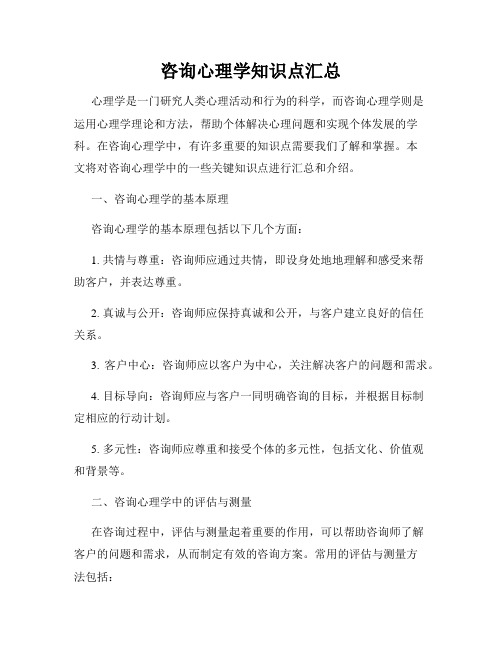
咨询心理学知识点汇总心理学是一门研究人类心理活动和行为的科学,而咨询心理学则是运用心理学理论和方法,帮助个体解决心理问题和实现个体发展的学科。
在咨询心理学中,有许多重要的知识点需要我们了解和掌握。
本文将对咨询心理学中的一些关键知识点进行汇总和介绍。
一、咨询心理学的基本原理咨询心理学的基本原理包括以下几个方面:1. 共情与尊重:咨询师应通过共情,即设身处地地理解和感受来帮助客户,并表达尊重。
2. 真诚与公开:咨询师应保持真诚和公开,与客户建立良好的信任关系。
3. 客户中心:咨询师应以客户为中心,关注解决客户的问题和需求。
4. 目标导向:咨询师应与客户一同明确咨询的目标,并根据目标制定相应的行动计划。
5. 多元性:咨询师应尊重和接受个体的多元性,包括文化、价值观和背景等。
二、咨询心理学中的评估与测量在咨询过程中,评估与测量起着重要的作用,可以帮助咨询师了解客户的问题和需求,从而制定有效的咨询方案。
常用的评估与测量方法包括:1. 面谈:通过面谈方式可以深入了解客户的问题和需求,并建立良好的沟通关系。
2. 问卷调查:通过设计和使用问卷,收集客户的信息和意见,帮助咨询师全面了解客户。
3. 测试:通过使用心理学测试工具,例如智力测试、人格测验等,评估客户的心理状态和能力。
三、咨询心理学中的沟通技巧在咨询过程中,良好的沟通技巧是咨询师必备的能力之一。
以下是一些常用的沟通技巧:1. 倾听与反馈:咨询师应倾听客户的言辞和情感,并及时给予积极的反馈,表达对客户的理解和支持。
2. 问开放性问题:通过提问开放性问题,可以激发客户更深层次的思考和表达,帮助客户更好地了解自己。
3. 非语言沟通:咨询师应注意并运用非语言沟通技巧,例如眼神接触、面部表情等,传达关怀和支持的信息。
四、咨询心理学中的干预与治疗方法咨询心理学中有许多干预与治疗方法,用于帮助客户解决心理问题和实现个体发展。
常见的方法包括:1. 认知行为疗法:通过帮助客户调整和改变不正确的思维模式和行为,达到缓解心理问题的目的。
心理咨询学知识点

心理咨询学知识点心理咨询学是一门关于人类心理及心理健康的学科,旨在帮助个体解决心理问题,提升生活质量。
以下是心理咨询学中的一些重要知识点:心理咨询的概念:心理咨询是指一种通过专业知识和技能,帮助个体解决心理问题,达到心理健康的过程。
心理咨询师通过沟通、倾听、引导等方式,帮助个体认识和理解自己的情绪、行为和思维,从而找到解决问题的方法。
心理咨询的目的:心理咨询的目的是帮助个体认识和理解自己的内心世界,解决心理问题,提升心理健康水平。
通过心理咨询,个体可以建立积极的生活态度,增强自信心,改善人际关系,提升工作效率,增进幸福感和满足感。
心理咨询的对象:心理咨询的对象主要包括有心理问题或困扰的个人、家庭、团体和组织。
而心理咨询师可以通过个别咨询、家庭咨询、团体咨询、组织咨询等形式,为不同对象提供专业的心理帮助和支持。
心理咨询的原则:心理咨询需要遵循一些重要原则,包括尊重个体的自主权和隐私权,保持专业的中立、客观和无偏见,确保咨询过程的保密性,以及遵循专业伦理规范等。
心理咨询师应该始终以个体的利益为先,保持专业和真诚的态度。
心理咨询的方法:心理咨询包括多种方法和技巧,例如认知行为咨询、人本主义咨询、动力性咨询、家庭系统咨询等。
心理咨询师根据个体的情况和需求,选择合适的咨询方法,帮助个体解决问题、实现自我成长和发展。
心理咨询的效果:心理咨询的效果取决于个体的配合程度、问题的严重程度、咨询师的水平等多种因素。
一般来说,心理咨询可以帮助个体认识和处理情绪问题,改善行为习惯,促进人际关系的发展,提升自我意识和自我调节能力,提高生活质量和幸福感。
总结:心理咨询学是一门关于心理健康和心理问题解决的学科,具有重要的实践价值。
了解心理咨询学知识点,能够帮助人们更好地理解心理咨询的概念、目的、对象、原则、方法和效果,促进个体心理健康的提升,实现个体的自我成长和发展。
通过专业的心理咨询,个体可以更好地认识和理解自己,找到解决问题的方法,实现心理健康和幸福生活。
心理咨询知识点总结

心理咨询知识点总结心理咨询是一门帮助人们解决心理问题、提升心理健康水平的学科和实践领域。
它涉及到众多的理论和技术,对于我们理解自己和他人的内心世界,以及应对生活中的各种挑战具有重要意义。
以下是对心理咨询相关知识点的总结。
一、心理咨询的定义和目标心理咨询是指运用心理学的方法,对在心理适应方面出现问题并企求解决问题的来访者提供心理援助的过程。
其目标主要包括帮助来访者缓解情绪困扰、改善人际关系、提高应对问题的能力、促进个人成长和发展等。
二、心理咨询的主要流派1、精神分析学派强调潜意识对人的行为和心理的影响,通过自由联想、梦的解析等方法,帮助来访者揭示内心深处被压抑的冲突和情感。
2、行为主义学派关注可观察的行为,认为不良行为是通过学习和强化形成的,可以通过行为矫正技术来改变。
3、人本主义学派重视人的自我实现和内在价值,强调以真诚、接纳和共情的态度与来访者建立关系,激发来访者的内在潜力。
4、认知行为学派认为人的情绪和行为问题往往源于不合理的认知,通过改变认知来调整情绪和行为。
三、心理咨询的过程1、建立关系咨询师与来访者建立信任、尊重和合作的关系,这是咨询成功的基础。
2、收集信息了解来访者的问题、背景、生活经历等,为后续的评估和干预提供依据。
3、评估问题对来访者的问题进行分析和诊断,确定问题的性质和严重程度。
4、制定方案根据评估结果,与来访者共同制定咨询目标和具体的干预方案。
5、实施干预运用各种咨询技术和方法,帮助来访者解决问题。
6、结束咨询当咨询目标达成或来访者具备了独立应对问题的能力时,结束咨询,并进行必要的回访。
四、心理咨询师的素质和能力1、专业知识和技能具备扎实的心理学理论基础,熟练掌握各种咨询技术和方法。
2、良好的职业道德遵守保密原则、尊重来访者的权利和尊严、保持中立和客观等。
3、个人特质具备敏锐的洞察力、较强的沟通能力、良好的倾听技巧、高度的同理心等。
五、心理咨询中的常见技术1、倾听技术包括专注倾听、理解性倾听、回应性倾听等,让来访者感受到被关注和理解。
心理咨询知识点归纳

心理咨询知识点归纳心理咨询是一种专业的辅导与支持方式,旨在帮助个体解决各种心理问题,并促进其个人成长和发展。
在心理咨询过程中,掌握一些基本的心理咨询知识点可以帮助咨询师更好地理解和辅导咨询对象。
本文将对心理咨询常见的知识点进行归纳和概述,以帮助读者更好地了解心理咨询。
一、咨询技巧与沟通方式1. 倾听与反馈:咨询师应具备良好的倾听技巧,包括积极倾听、无条件接受、理解并验证咨询对象的言辞和情感。
同时,及时给予反馈,以表达对咨询对象的关注和理解。
2. 外貌与举止:咨询师在咨询过程中的外貌与举止会影响咨询对象的感知和信任。
因此,咨询师应保持专业、友好和开放的态度,以建立良好的咨询关系。
3. 关系建立与维系:咨询师需要投入时间和精力来建立和维系与咨询对象的关系。
这包括建立互信关系、保持中立性、尊重咨询对象的权利和选择,并确保咨询关系的保密性。
4. 面对情感与情绪:咨询师应学会处理和引导咨询对象的情绪与情感。
咨询师需要表达对咨询对象的理解和关切,同时帮助咨询对象更好地应对与表达自己的情感。
二、常见心理问题与症状1. 抑郁症:抑郁症是一种常见的心理问题,表现为情绪低落、无法感到快乐、对日常活动失去兴趣等。
咨询师应通过与咨询对象的对话来了解其具体的症状和情感体验,并制定相应的干预计划。
2. 焦虑症:焦虑症表现为持续的紧张、担忧和恐惧感,可能伴随着心慌、呼吸困难、失眠等生理症状。
咨询师应通过认知行为疗法等方法,帮助咨询对象减轻焦虑症状并改变负面的思维模式。
3. 自卑感:自卑感是指个体对自身价值和能力的低估,常常伴随着自我否定、自我批评和自我贬低。
咨询师应通过提升咨询对象的自尊心、改变其对自我的认知来帮助其树立积极的自我形象。
4. 压力与应对:咨询师需要了解咨询对象所面临的压力来源,并帮助他们建立有效的应对机制。
技巧包括情绪调节、时间管理和问题解决等。
5. 冲突管理:咨询师需要帮助咨询对象了解冲突的本质和产生原因,并引导他们学习良好的沟通技巧和解决冲突的策略。
心理咨询的核心知识点

心理咨询的核心知识点在现代社会中,人们面临着各种各样的压力和挑战,心理健康问题日益凸显。
心理咨询作为一种帮助人们解决心理困扰、提升心理健康水平的专业服务,其重要性不言而喻。
接下来,让我们一起深入了解心理咨询的核心知识点。
心理咨询的定义与范畴是首先需要明确的。
简单来说,心理咨询是运用心理学的方法,对在心理适应方面出现问题并企求解决问题的求询者提供心理援助的过程。
它涵盖了广泛的领域,包括但不限于情感问题、人际关系困扰、职业发展迷茫、心理压力调适等。
心理咨询的基本原则是整个咨询过程的基石。
其中,尊重原则至关重要。
咨询师要尊重来访者的人格、价值观、生活方式和个人隐私,给予他们充分的信任和接纳。
保密性原则也是不可或缺的,咨询师必须为来访者的个人信息和咨询内容严格保密,让来访者能够毫无顾虑地敞开心扉。
中立原则要求咨询师在咨询过程中保持客观中立,不偏袒、不评判,为来访者提供一个安全、公正的交流环境。
良好的咨询关系是心理咨询取得成效的关键。
咨询师需要通过真诚、共情和积极关注,与来访者建立起信任和亲密的关系。
真诚意味着咨询师真实地展现自己,不伪装、不做作。
共情则是能够设身处地地理解来访者的感受和体验,让他们感到被理解和被接纳。
积极关注则是关注来访者的积极面和潜力,帮助他们发掘自身的优势和资源。
心理咨询中常用的方法和技术多种多样。
比如,认知行为疗法通过改变来访者的不良认知和行为模式,来改善其心理状态。
精神分析疗法则深入挖掘来访者潜意识中的冲突和欲望,帮助他们解决深层次的心理问题。
人本主义疗法强调以来访者为中心,激发其自我实现的潜能。
此外,还有家庭治疗、团体治疗等多种形式,根据来访者的具体情况选择合适的方法。
在心理咨询过程中,评估和诊断也是重要环节。
咨询师需要通过面谈、心理测试等手段,对来访者的心理状况进行全面评估,明确问题的性质、程度和成因,为制定有效的咨询方案提供依据。
但需要注意的是,心理咨询中的诊断不同于医学诊断,它更侧重于对心理问题的功能性评估。
西师版心理咨询技术第二章知识点

西师版心理咨询技术(李作山)第二章心理咨询过程知识点咨询过程:心理咨询过程是咨询师根据实际的需要,运用单一或整合的处理倾向与态度,给来访者以指导、帮助、教育和启发,使其发生改变的互相互动和作用的过程。
这一过程包括了一系列的阶段和若干环节。
咨访关系:又称咨询关系或者治疗关系,是指心理咨询师与求助者之间的互动关系。
共情:是影响咨访关系最核心的因素,又称为“同感”“神入”“感情移入”“投情”“同理心”等,其含义是指体验他人的精神世界就像体验自己的精神世界一样的能力,即咨询师能够设身处地、将心比心地理解与分担来访者内心世界各种负荷的能力,其核心是理解对方的感受。
积极关注:概念源自与罗杰斯他提出的以人为中心疗法被称为“无条件积极关注”。
积极关注是一种共情的态度指咨询师以积极的而非评价的态度看待来访者,不以来访者行为的好坏选择对待方式,而是选择性的关注和突出来访者言语与行为中的长处、积极和光明面,利用其自身的积极因素促使来访者发生变化。
尊重:咨询师把来访者作为有思想感情、内心体验、生活追求、独立性和自主性的人去对待,能够接受和悦纳来访者不同于自己的人生观、价值观、世界观、人格特征、行为方式、生活态度和思维模式等。
温暖:也可叫做温情、热情,与尊重的含义相似,但比尊重更能拉近咨询师与来访者之间的距离温暖是咨询师主观态度的一种体现,不仅需要语言的表达,而且还需要非语言沟通形式。
只有咨询师是真正关心来访者、真正充满爱心、真正做到与来访者的共情,言谈、姿势、动作、眼神和面部表情等方面最大限度地流露出来。
因此,温暖需要心理咨询师自己从内心深处去开发。
真诚:罗杰斯提倡咨询过程中,咨询师对来访者的态度真诚。
咨询师不带假面具,不隐瞒伪装和回避自己的想法、优缺点,以真实的我出现,不刻意取悦对方。
真实可信地投入咨访关系中。
真诚包括了咨询师真诚地对待自己和真诚地对待来访者两个方面。
转介:是心理咨询过程中常见的一种现象,指由于各种原因使得咨询师必须将前来求助的来访者转给更适合对方的其他咨询师或者专业机构。
心理咨询上的平等、共情、真诚、接纳与积极关注、尊重的内涵
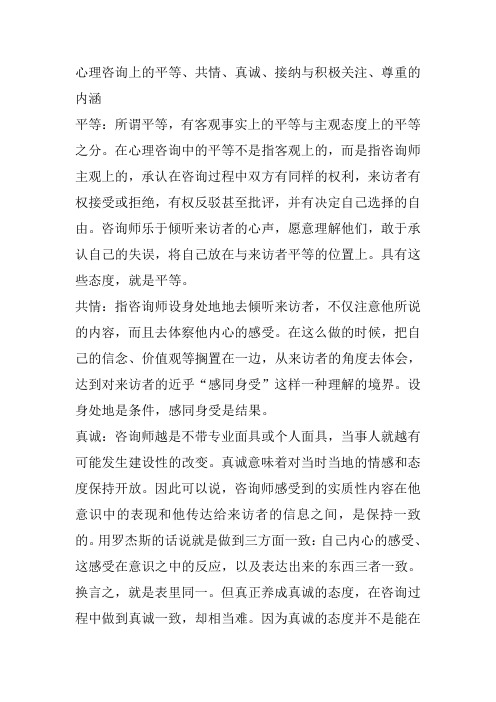
心理咨询上的平等、共情、真诚、接纳与积极关注、尊重的内涵平等:所谓平等,有客观事实上的平等与主观态度上的平等之分。
在心理咨询中的平等不是指客观上的,而是指咨询师主观上的,承认在咨询过程中双方有同样的权利,来访者有权接受或拒绝,有权反驳甚至批评,并有决定自己选择的自由。
咨询师乐于倾听来访者的心声,愿意理解他们,敢于承认自己的失误,将自己放在与来访者平等的位置上。
具有这些态度,就是平等。
共情:指咨询师设身处地地去倾听来访者,不仅注意他所说的内容,而且去体察他内心的感受。
在这么做的时候,把自己的信念、价值观等搁置在一边,从来访者的角度去体会,达到对来访者的近乎“感同身受”这样一种理解的境界。
设身处地是条件,感同身受是结果。
真诚:咨询师越是不带专业面具或个人面具,当事人就越有可能发生建设性的改变。
真诚意味着对当时当地的情感和态度保持开放。
因此可以说,咨询师感受到的实质性内容在他意识中的表现和他传达给来访者的信息之间,是保持一致的。
用罗杰斯的话说就是做到三方面一致:自己内心的感受、这感受在意识之中的反应,以及表达出来的东西三者一致。
换言之,就是表里同一。
但真正养成真诚的态度,在咨询过程中做到真诚一致,却相当难。
因为真诚的态度并不是能在咨询中表现出来的,而是咨询师在生活中一以贯之的一种待人品质。
事实上,真诚是无法演的,它是一种发乎其中而形乎其外的东西。
这就要求咨询师在生活中也是一个真诚的人。
接纳与积极关注:二者意思相近。
其成分一是咨询师面对来访者有一种温情的关切之感,这种关怀是无私的,不指望回报的,是一种喜欢他、想要为他做点什么的感受;二是感受到来访者是一个独一无二的人,是对这个人整体性的接纳,而不是对他身上合胃口的地方接受,即对他整个人的一种关切。
尊重:从承认来访者作为一个人的价值,及由此而产生的对来访者的无条件的接纳,是一个人发自个人人性的基本的东西,只有存在这种“泛爱”式的仁爱之心,才能谈得上对来访者的尊重。
常见的几个心理咨询概念

心理咨询中常见的几个概念及其区分人生在世,沧桑磨难,人们的心灵时刻在经受着现实的种种考验,为呵护好自己的心灵,为满足人们自我心理保健的需求,大家有必要知道一点心理健康方面的专业知识,使大家了解什麽是心理健康和心理不健康以及心理不健康有那些种类等等,以便更好地自我调节心理节奏,保证自己快乐健康的学习、工作、生活。
今天我们将在这里共同学习几个常见的心理咨询的概念,这几个概念也是我们日常生活中经常提到的。
一、心理的本质是什麽;二、什麽是正常心理和异常心理;三、什麽是心理健康与心理不健康;四、心理不健康对人的躯体影响。
一、心理的本质是什麽心理是脑的机能,脑是心理活动的器官。
没有脑的心理,或者说没有脑的思维是不存在的。
正常发育的大脑为心理的发展提供了物质基础。
心理是客观现实的反映。
大脑是心理活动的器官,有反映外界事物产生心理的机能,心理并不是大脑本身所固有的,心理现象是事物作用于人的感觉器官,通过大脑活动而产生的。
客观现实是心理的源泉和内容。
离开客观现实来考察人的心理,心理就变成了无源之水,无本之木。
对人来说,客观现实既包括自然界,也包括人类社会还包括自己。
如:20世纪20年代,印度发现的两个狼孩,即让狼叼走养大的孩子。
他们有健全的人的大脑,但是,他们脱离了人类社会,是在狼群里张大的。
他们只具有狼的本性而不具备人的心理心理是社会的产物,离开了人类社会即使有人的大脑,也不能产生人的心理。
心理的反映不是镜子式的反映,而是能动的反映。
心理是主观映象,这种映可以是事物的形象,也可以是概念,甚至可以是体验。
如人们看到瀑布,不同的人有不同的认识。
二、什麽是正常心理和异常心理世界上一切事物,都有正和反两个方面,人的心理活动也不例外。
在我们生存的社会人群中,正常心理活动和异常心理活动总是表现在不同个体身上,于是,就形成了心理正常的群体和心理异常群体。
对心理异常群体的研究边形成了心理学的一个分支学科“变态心理学”。
正常心理活动,具有三大功能:能保障人作为生物体顺利地适应环境,健康地生存发展;能保障人作为社会实体正常地进行人际交往,在家庭、社会团体、机构中正常地肩负责任,使人类赖以生存的社会组织正常运行;能使人类正常地、正确地反映、认识客观世界的本质及其规律性,以便创造性地改造世界,创造出更适合人类生存的环境条件。
心理咨询知识点
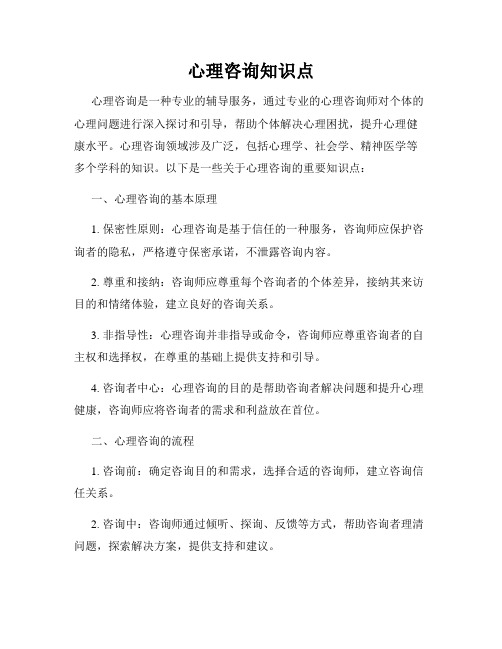
心理咨询知识点心理咨询是一种专业的辅导服务,通过专业的心理咨询师对个体的心理问题进行深入探讨和引导,帮助个体解决心理困扰,提升心理健康水平。
心理咨询领域涉及广泛,包括心理学、社会学、精神医学等多个学科的知识。
以下是一些关于心理咨询的重要知识点:一、心理咨询的基本原理1. 保密性原则:心理咨询是基于信任的一种服务,咨询师应保护咨询者的隐私,严格遵守保密承诺,不泄露咨询内容。
2. 尊重和接纳:咨询师应尊重每个咨询者的个体差异,接纳其来访目的和情绪体验,建立良好的咨询关系。
3. 非指导性:心理咨询并非指导或命令,咨询师应尊重咨询者的自主权和选择权,在尊重的基础上提供支持和引导。
4. 咨询者中心:心理咨询的目的是帮助咨询者解决问题和提升心理健康,咨询师应将咨询者的需求和利益放在首位。
二、心理咨询的流程1. 咨询前:确定咨询目的和需求,选择合适的咨询师,建立咨询信任关系。
2. 咨询中:咨询师通过倾听、探询、反馈等方式,帮助咨询者理清问题,探索解决方案,提供支持和建议。
3. 咨询后:总结咨询过程和成果,评估咨询效果,建立维持心理健康的长期机制。
三、心理咨询的适用对象1. 情绪问题:焦虑、抑郁、恐惧、愤怒等情绪问题。
2. 人际问题:与家人、朋友、同事、伴侣之间的关系问题。
3. 成长问题:自我认同、生活意义、职业规划等成长问题。
四、心理咨询的技术方法1. 倾听:咨询师要善于倾听咨询者的内心需求和情感体验。
2. 探询:通过提问和探询,帮助咨询者深入了解自己的问题,并找到解决方案。
3. 反馈:及时给予咨询者积极的反馈和建议,增强咨询效果。
4. 引导:在适当时机引导咨询者自我探索和成长,达到心理健康的目标。
五、心理咨询的发展趋势1. 科技化:心理咨询将越来越依赖互联网和移动通讯技术,提供在线咨询、手机APP等服务。
2. 多元化:心理咨询将融合更多的心理学理论和治疗方法,拓展咨询服务的领域和对象。
3. 国际化:心理咨询将逐渐走向国际化,借鉴和吸收国外心理学研究成果,推动心理咨询的国际交流与合作。
心理咨询知识点
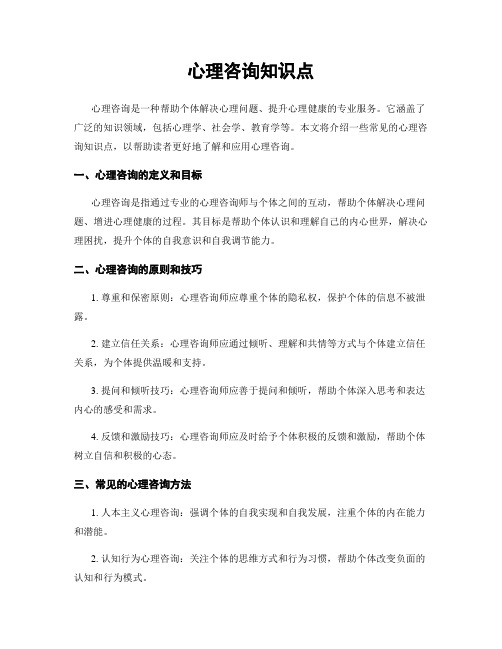
心理咨询知识点心理咨询是一种帮助个体解决心理问题、提升心理健康的专业服务。
它涵盖了广泛的知识领域,包括心理学、社会学、教育学等。
本文将介绍一些常见的心理咨询知识点,以帮助读者更好地了解和应用心理咨询。
一、心理咨询的定义和目标心理咨询是指通过专业的心理咨询师与个体之间的互动,帮助个体解决心理问题、增进心理健康的过程。
其目标是帮助个体认识和理解自己的内心世界,解决心理困扰,提升个体的自我意识和自我调节能力。
二、心理咨询的原则和技巧1. 尊重和保密原则:心理咨询师应尊重个体的隐私权,保护个体的信息不被泄露。
2. 建立信任关系:心理咨询师应通过倾听、理解和共情等方式与个体建立信任关系,为个体提供温暖和支持。
3. 提问和倾听技巧:心理咨询师应善于提问和倾听,帮助个体深入思考和表达内心的感受和需求。
4. 反馈和激励技巧:心理咨询师应及时给予个体积极的反馈和激励,帮助个体树立自信和积极的心态。
三、常见的心理咨询方法1. 人本主义心理咨询:强调个体的自我实现和自我发展,注重个体的内在能力和潜能。
2. 认知行为心理咨询:关注个体的思维方式和行为习惯,帮助个体改变负面的认知和行为模式。
3. 解决问题导向心理咨询:通过帮助个体制定目标和解决问题的方法,帮助个体找到解决心理问题的有效途径。
4. 家庭系统心理咨询:关注个体与家庭系统之间的互动和影响,帮助个体改善家庭关系和解决家庭问题。
四、心理咨询的适用范围心理咨询适用于各个年龄段的个体,包括儿童、青少年、成人和老年人。
它可以应用于各种心理问题,如焦虑、抑郁、人际关系问题、学习困难等。
此外,心理咨询还可以应用于组织和社区,帮助解决工作和社会问题。
五、心理咨询的效果评估心理咨询的效果可以通过多种方式进行评估,包括客观指标和主观感受。
客观指标可以通过心理测试和行为观察等方式进行评估,主观感受可以通过个体的反馈和满意度调查等方式进行评估。
六、心理咨询的发展趋势随着社会的不断进步和人们对心理健康的重视,心理咨询领域也在不断发展。
心理咨询主要知识点
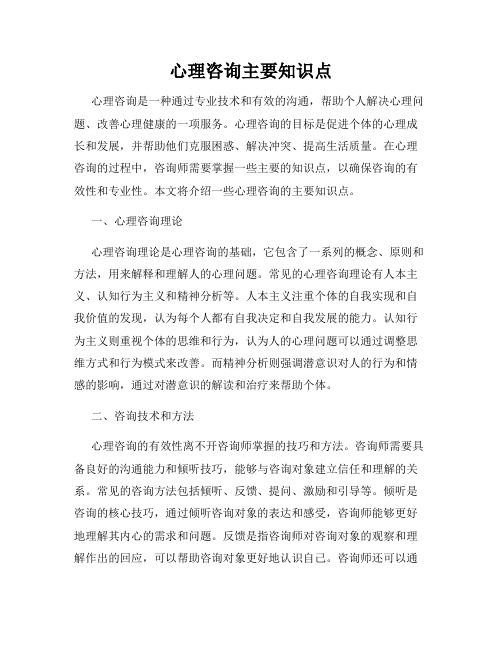
心理咨询主要知识点心理咨询是一种通过专业技术和有效的沟通,帮助个人解决心理问题、改善心理健康的一项服务。
心理咨询的目标是促进个体的心理成长和发展,并帮助他们克服困惑、解决冲突、提高生活质量。
在心理咨询的过程中,咨询师需要掌握一些主要的知识点,以确保咨询的有效性和专业性。
本文将介绍一些心理咨询的主要知识点。
一、心理咨询理论心理咨询理论是心理咨询的基础,它包含了一系列的概念、原则和方法,用来解释和理解人的心理问题。
常见的心理咨询理论有人本主义、认知行为主义和精神分析等。
人本主义注重个体的自我实现和自我价值的发现,认为每个人都有自我决定和自我发展的能力。
认知行为主义则重视个体的思维和行为,认为人的心理问题可以通过调整思维方式和行为模式来改善。
而精神分析则强调潜意识对人的行为和情感的影响,通过对潜意识的解读和治疗来帮助个体。
二、咨询技术和方法心理咨询的有效性离不开咨询师掌握的技巧和方法。
咨询师需要具备良好的沟通能力和倾听技巧,能够与咨询对象建立信任和理解的关系。
常见的咨询方法包括倾听、反馈、提问、激励和引导等。
倾听是咨询的核心技巧,通过倾听咨询对象的表达和感受,咨询师能够更好地理解其内心的需求和问题。
反馈是指咨询师对咨询对象的观察和理解作出的回应,可以帮助咨询对象更好地认识自己。
咨询师还可以通过提问、激励和引导等方法,引导咨询对象思考和探索解决问题的途径。
三、心理评估与诊断在心理咨询过程中,咨询师需要进行心理评估和诊断,以全面了解咨询对象的心理状况和问题。
心理评估包括面谈、观察、心理测试等多种方法,通过这些方法,咨询师可以收集和分析咨询对象的信息,了解其个性特点、心理困扰等方面的问题。
心理诊断则是在评估的基础上,根据心理学的分类系统,对咨询对象的心理问题进行判断和归类。
心理评估和诊断的目的是为了更好地理解咨询对象的问题,从而提出相应的咨询方案和处理方法。
四、危机干预与心理疏导心理咨询常常面对的是咨询对象的心理危机,如焦虑、抑郁、挫折等。
心理咨询的基础知识
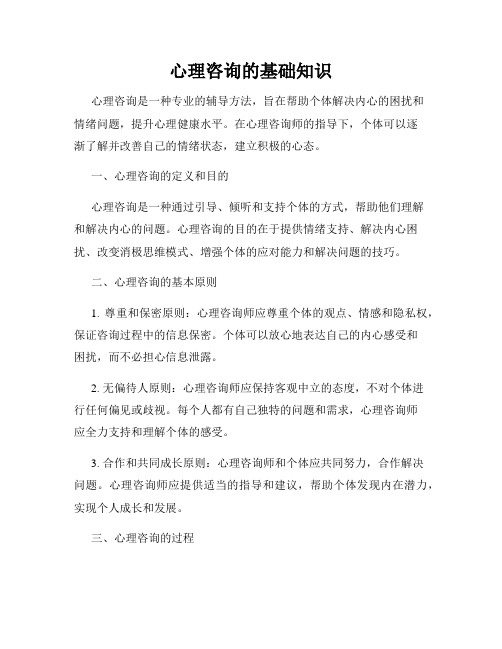
心理咨询的基础知识心理咨询是一种专业的辅导方法,旨在帮助个体解决内心的困扰和情绪问题,提升心理健康水平。
在心理咨询师的指导下,个体可以逐渐了解并改善自己的情绪状态,建立积极的心态。
一、心理咨询的定义和目的心理咨询是一种通过引导、倾听和支持个体的方式,帮助他们理解和解决内心的问题。
心理咨询的目的在于提供情绪支持、解决内心困扰、改变消极思维模式、增强个体的应对能力和解决问题的技巧。
二、心理咨询的基本原则1. 尊重和保密原则:心理咨询师应尊重个体的观点、情感和隐私权,保证咨询过程中的信息保密。
个体可以放心地表达自己的内心感受和困扰,而不必担心信息泄露。
2. 无偏待人原则:心理咨询师应保持客观中立的态度,不对个体进行任何偏见或歧视。
每个人都有自己独特的问题和需求,心理咨询师应全力支持和理解个体的感受。
3. 合作和共同成长原则:心理咨询师和个体应共同努力,合作解决问题。
心理咨询师应提供适当的指导和建议,帮助个体发现内在潜力,实现个人成长和发展。
三、心理咨询的过程1. 第一次咨询:在第一次咨询中,心理咨询师会与个体建立良好的关系并了解个体的问题。
个体可以向咨询师详细描述自己的困扰、感受和期望,咨询师会用耐心和关注倾听,并提供初步的建议。
2. 咨询目标设定:在咨询开始后,心理咨询师会与个体共同设定咨询的具体目标。
这些目标可以是解决特定问题、改变消极思维模式、增强应对能力等。
目标的设定有助于指导咨询过程并评估咨询效果。
3. 咨询技巧运用:心理咨询师通过运用各种咨询技巧来帮助个体解决内心的问题。
例如,倾听、反馈、提问、激励等技巧都是心理咨询师常用的工具。
这些技巧有助于引导和支持个体的自我探索和成长。
4. 咨询终结和评估:当个体达到预期的咨询目标或心理咨询过程结束时,心理咨询师会进行终结和评估。
这个阶段主要关注个体的成长和变化,并向个体提供维持心理健康的建议和支持。
四、心理咨询的适用范围心理咨询广泛适用于各个年龄段和社会阶层的人群。
心理咨询知识点

心理咨询知识点心理咨询是一种通过与心理咨询师的交谈来解决个人心理问题的方法。
在现代社会中,心理问题日益凸显,越来越多的人选择寻求心理咨询的帮助。
本文将介绍一些常见的心理咨询知识点,包括咨询的概念、咨询流程、咨询技巧等内容。
一、心理咨询的概念心理咨询是指心理咨询师通过与受访者的交流,帮助其解决心理问题或应对心理困境的一种专业服务。
心理咨询师以专业的知识和技能,提供情感支持、认知重构、问题解决等方面的帮助,帮助个人恢复心理健康。
二、心理咨询的流程1. 建立咨询关系:心理咨询的第一步是建立良好的咨询关系。
咨询师通过关怀、尊重和倾听,为受访者创造一个安全、信任的环境。
2. 问题阐述:受访者可以逐渐描述自己的问题和困扰。
咨询师通过提问和倾听,帮助受访者进一步理解和探索问题的本质。
3. 目标设定:在问题阐述的基础上,咨询师与受访者一起制定明确的治疗目标。
目标应该具体、可行,并与受访者的需求相符合。
4. 问题分析:咨询师通过对问题的深入分析,帮助受访者了解问题的起因和维持因素。
并提出相应的解决方案。
5. 实施方案:根据问题分析的结果,咨询师和受访者一起制定具体的实施方案。
方案可能包括改变思维方式、培养积极心态等。
6. 评估和调整:咨询师会和受访者一起评估治疗效果,并根据需要对方案进行调整,以达到最佳的治疗效果。
三、心理咨询的技巧1. 倾听技巧:咨询师需要倾听受访者的内心,给予充分的关注和理解。
倾听时,咨询师需要保持专注,通过肢体语言和回应发出积极的信号。
2. 问询技巧:咨询师通过提问帮助受访者深入思考和表达。
提问应该具有开放性,以便引导受访者展开更深入的探索。
3. 反馈技巧:咨询师可以对受访者的观点和行为给予反馈,帮助受访者更好地理解自己。
反馈应该客观、正面,并具有建设性。
4. 引导技巧:咨询师可以使用各种引导技巧,如激励、指导、启示等,帮助受访者找到解决问题的路径。
5. 情感支持:咨询师应该表达对受访者的情感支持和理解,帮助受访者建立自信和积极心态。
心理咨询基础知识
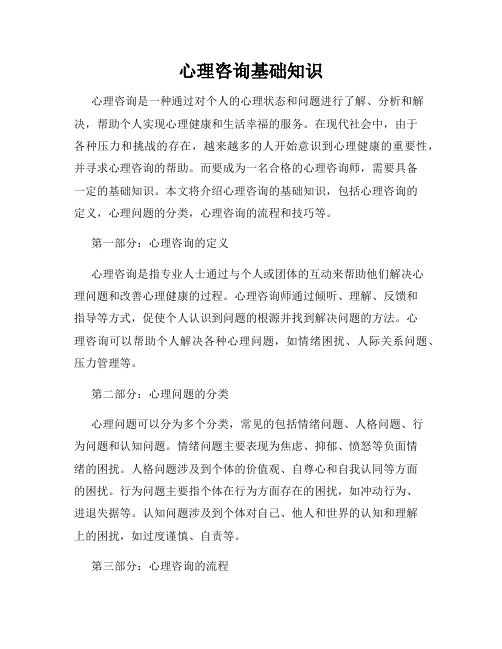
心理咨询基础知识心理咨询是一种通过对个人的心理状态和问题进行了解、分析和解决,帮助个人实现心理健康和生活幸福的服务。
在现代社会中,由于各种压力和挑战的存在,越来越多的人开始意识到心理健康的重要性,并寻求心理咨询的帮助。
而要成为一名合格的心理咨询师,需要具备一定的基础知识。
本文将介绍心理咨询的基础知识,包括心理咨询的定义,心理问题的分类,心理咨询的流程和技巧等。
第一部分:心理咨询的定义心理咨询是指专业人士通过与个人或团体的互动来帮助他们解决心理问题和改善心理健康的过程。
心理咨询师通过倾听、理解、反馈和指导等方式,促使个人认识到问题的根源并找到解决问题的方法。
心理咨询可以帮助个人解决各种心理问题,如情绪困扰、人际关系问题、压力管理等。
第二部分:心理问题的分类心理问题可以分为多个分类,常见的包括情绪问题、人格问题、行为问题和认知问题。
情绪问题主要表现为焦虑、抑郁、愤怒等负面情绪的困扰。
人格问题涉及到个体的价值观、自尊心和自我认同等方面的困扰。
行为问题主要指个体在行为方面存在的困扰,如冲动行为、进退失据等。
认知问题涉及到个体对自己、他人和世界的认知和理解上的困扰,如过度谨慎、自责等。
第三部分:心理咨询的流程心理咨询的流程可以分为四个阶段:接触阶段、评估阶段、干预阶段和结束阶段。
在接触阶段,心理咨询师与个体建立联系,并确定咨询的目标和方向。
在评估阶段,心理咨询师通过面谈、测试和观察等方式了解个体的心理问题和背景。
在干预阶段,心理咨询师根据评估结果选择适当的技术和方法来帮助个体解决心理问题。
在结束阶段,心理咨询师和个体一起总结和评估咨询的效果,并确定后续的发展方向。
第四部分:心理咨询的技巧心理咨询师需要具备一定的技巧来有效地进行咨询。
首先是倾听技巧,心理咨询师应当给予个体充分的关注和理解,表达出自己的共情和尊重。
其次是提问技巧,心理咨询师可以通过恰当的问题来引导个体思考和表达内心的困扰。
另外,心理咨询师还要善于运用反馈和指导技巧,帮助个体认识到问题的本质,并找到解决问题的方法。
心理咨询基础知识

心理咨询是一种专业的心理服务,旨在帮助个体解决心理问题,提高生活质量和心理健康水平。
心理咨询师通过与客户建立良好的沟通关系,运用心理学原理和技术,帮助客户认识和解决问题,实现自我成长和发展。
以下是心理咨询的基础知识:1. 心理咨询的定义:心理咨询是一种专业的心理服务,通过与客户建立良好的沟通关系,运用心理学原理和技术,帮助客户认识和解决问题,实现自我成长和发展。
2. 心理咨询的目的:心理咨询的主要目的是帮助个体解决心理问题,提高生活质量和心理健康水平。
具体包括:缓解心理压力、解决心理困扰、提高自我认识、促进人际关系和谐、提高生活满意度等。
3. 心理咨询的对象:心理咨询的对象主要包括面临心理困扰、压力过大、情绪波动、人际关系紧张等问题的个人。
这些问题可能涉及生活、工作、学习、家庭等方面。
4. 心理咨询的原则:心理咨询应遵循以下原则:(1)尊重客户的自主权和隐私权;(2)保持客观、中立的态度;(3)以客户为中心,关注客户的需求和感受;(4)运用科学的方法和技术,确保咨询效果;(5)注重预防和发展,促进客户的自我成长。
5. 心理咨询的过程:心理咨询的过程通常包括以下几个阶段:(1)建立信任关系:咨询师通过倾听、理解和关心,与客户建立良好的沟通关系;(2)评估问题:咨询师通过提问、观察和分析,了解客户的问题和需求;(3)制定咨询计划:咨询师根据评估结果,制定合适的咨询目标和方法;(4)实施咨询:咨询师运用心理学原理和技术,帮助客户解决问题;(5)评估咨询效果:咨询师通过与客户的反馈和自己的观察,评估咨询的效果;(6)结束咨询:咨询师与客户共同评估咨询过程和结果,决定是否结束咨询。
6. 心理咨询的方法和技术:心理咨询的方法和技术主要包括:(1)认知行为疗法:通过改变客户的思维方式和行为模式,解决心理问题;(2)人本主义疗法:关注客户的内在价值和潜能,促进自我成长和发展;(3)精神分析疗法:通过探索客户的潜意识,解决心理冲突和矛盾;(4)家庭治疗:关注家庭成员之间的互动和沟通,改善家庭关系;(5)团体治疗:通过小组讨论和互动,帮助客户认识和解决问题。
咨询心理学3-积极关注2

第四,进行积极关注时不仅要锦上添 花,更要雪中送炭。
第五,避免对方的故意迎合或逃避方 式。
第六,最好是启发求助者学会自己去 发现自己的长处和潜力,自己学会鼓 励自己。
单元小结
1.促进求助者的自我发现、潜能开发,从而促进 自我成长,正是心理咨询的最高目标。
2.积极关注既是咨询师应有的理念,亦是一种咨 询的技术。
积极关注
含义
是对求助者的言语和行为的闪光点、 光明面或长处和潜力予以有选择性的 关注,从而使求助者拥有更客观的自 我形象、正向的价值观和积极的人生 态度。
基本认识
积极关注的观点涉及到对人的一种基本认 识、基本情感和信念,即人是可以改变的。 此外,每个人总会有这样那样的长处、优 点,每个人的身上都有潜力存在,如果通 过自己的努力、外界的帮助,每个人都可 以比现在更好。这一观点对于一个咨询师 来说是非常重要的。
无条件积 “你不做我会不高兴,但这不会影响我对 极
领导工作中有 了失误 你该 怎么办?
对事不对人
时间找成就
空间找优势
案例分享: 初二的学生 期中英语考试 52分 回家后…
无条件积极关注
对事不对人
时间找成就
空间找优势
原则
多鼓励积极面,因为人是需要鼓励和 肯定的。特别是对不自信、不踏实、 情绪低落的求助者。
练习
求助者:最近,我学习越来越吃力,竞争 压力很大。前几天的一次考试,我居然只 得了第五名,把我的脸都丢完了。我以前 每次都是一、二名的。我越想越不开心, 以致睡觉都不好。我担心这样下去会得倒 数第一的。
讨论
求助者来咨询,是来解决问题的,不 是来听表扬、赞美的,既然如此,为 什么还要强调对求助者的积极关注? 这与解决求助者的心理问题有什么关 系?
心理咨询的核心内容

心理咨询的核心内容是:建立良好的咨询关系心理咨询的内容:建立关系、确定目标、制定方案、实施咨询和评估效果影响建立咨询关系建立的因素1.救助者的咨询动机、合作态度、期望程度、自我觉察水平、行为方式、对咨询师的反映2.咨询师的态度如何恰当地表达尊重1.求助者初次来方式适当的询问,表达关切2.注意倾听求助者的叙述:适度地运用倾听技巧,重视言语与非言语行为的表达,全神贯注留心求助者的一言一行。
3.咨询时耐心,认真,不厌其烦4.咨询结束时,使咨询者感受到温暖使用真诚时应注意的四个问题1.真诚不等于说实话2.真诚不是自我发泄3.真诚应实事求是4.真诚应适度使用共情应注意的问题1.咨询师应走出自己的参照框架而进入求助者的参照框架2.咨询师必要时要验证自己是否做到共情3.要因人而异4.要善于是用身体语言5.善于把握角色6.考虑到求助者的特点和文化背景积极关注应该注意的问题1.避免盲目乐观2.反对过分消极3.立足实事求是制定咨询目标的五个工作程序1.全面掌握求助者的有关资料,列出求助者的全部问题(应考虑年龄特征、性格特征、问题特征、文化特征)2.判断求助者心理问题的类型和严重程度3.选择优先解决的问题4.想求助者说明有效咨询目标的基本要素5.近期目标和远期目标的整合制定咨询方案的工作程序一.划分咨询阶段第一阶段为初级阶段:诊断阶段1.咨询关系2.收集相关信息3.进行心理诊断4.调整求助动机5.简历咨询目标6.制定实施方案第二阶段:咨询阶段是心理咨询最核心、最重要的实质性阶段,咨询师的主要任务是帮助求助者分析和解决问题,改变其不适应的认知、情绪或行为。
第三阶段:巩固阶段是咨询的总结、提高阶段二.制定咨询方案:包括的内容1.咨询目标2.3.4.咨询的具体方法、过程和原理5.咨询的效果及评价手段6.咨询的费用7.其他问题及有关说明参与性技术1.倾听2.开放式询问或封闭式询问3.鼓励和重复技术4.内容反映:也称释义,咨询师把求助者的主要言谈、思想加以综合总理,再反馈给求助者,一方面使求助者有机会再次剖析自己的困扰,重新组合那些零散的事件和关系,深化会谈的内容。
- 1、下载文档前请自行甄别文档内容的完整性,平台不提供额外的编辑、内容补充、找答案等附加服务。
- 2、"仅部分预览"的文档,不可在线预览部分如存在完整性等问题,可反馈申请退款(可完整预览的文档不适用该条件!)。
- 3、如文档侵犯您的权益,请联系客服反馈,我们会尽快为您处理(人工客服工作时间:9:00-18:30)。
积极关注的意义
积极关注满足了个体心理上的需要,满足了个体被关爱,尊重和价值 的实现。 对于儿童来讲,积极关注更是对其自我价值和人格特质的塑造有着突 出的作用。父母对儿童期孩子的积极关注有助于建立良好的亲子关系和 品格,而青少年期老师以及社会环境的人群对其的积极关注会影响其学 习方向、方式和态度以及对待事情归因的方式和处理的办法。 积极关注还会影响 个体的同一性,
• Unconditional positive regard is where parents, significant others (and the humanist therapist) accepts and loves the person for what he or she is. Positive regard is not withdrawn if the person does something wrong or makes a mistake. The consequences of unconditional positive regard are that the person feels free to try things out and make mistakes, even though this may lead to getting it worse at times. People who are able to self-actualize are more likely to have received unconditional positive regard from others, especially their parents in childhood. • Conditional positive regard is where positive regard, praise and approval, depend upon the child, for example, behaving in ways that the parents think correct. Hence the child is not loved for the person he or she is, but on condition that he or she behaves only in ways approved by the parent(s). At the extreme, a person who constantly seeks approval from other people is likely only to have experienced conditional positive regard as a child
无条件积极关注(Unconditional positive regard):父 母,咨询师以及其他人群无条件积极关注该对象,不 管他做的是否是错事。无条件积极关注的结果就是会 让对象愿意开放自由地尝试事物,尽管事情可能会导 致一些错误,趋向于自我实现的人群更加愿意接受来 自他人的无条件积极关注,特别是孩子在儿时与父母 的交往中。 有条件积极关注(conditional positive regard):举例 来说在孩童期,父母会确定事情的正确性,然后才会 对孩子进行表扬和支持。这样以后,孩子被奖励的标 准就是他的行为是否得到父母的认可,而不是取决于 执行奖励的是谁。延伸开来讲,就像小孩子一样,个 体寻求到夸奖的的条件取决于其他人的认可。
自我实现 尊重的需要 归属与爱的需要 安全的需要 生理的需要
积极关注(positive regard):人本主义心 理学家罗杰斯认为孩子拥有2种额外的需 要,自我价值和积极关注。自我价值对于 心理健康的确保和自我目标的实现具有非 常重大的意义。而自我价值的成长来源于 儿时同父母亲的关系,长大后来源于与周 围人的交往。 罗杰斯还相信从小到大我们都需要被其他 人积极关注,我们需要感受到价值,被尊 重,被关爱。积极关注所做的就是在社会 交往中其他人对我们自身的评估和判断。 积极关注可以分为无条件积极关注和有条 件积极关注。
积极关注 积极关注 需要
········
汪勇彪
2011/1/10
积极关注的概念以及相关的延伸
积极关注的意义
积极关注的实施准则
积极关注的概念以及相关的延伸
积极关注的意义
积极关注的实施准则
积极关注的概念以及相关的延伸
积极关注(positive regard):人本主义心理学家罗杰斯认为
孩子拥有2种额外的需要,自我价值和积极关注。自我价值对于心 理健康的确保和自我目标的实现具有非常重大的意义。而自我价值 的成长来源于儿时同父母亲的关系,长大后来源于与周围人的交往。 。 罗杰斯还相信从小到大我们都需要被其他人积极关注,我们需要感 受到价值,被尊重,被关爱。积极关注所做的就是在社会交往中其 他人对我们自身的评估和判断。积极关注可以分为无条件积极关注 和有条件积极关注。
• A visual aid Maslow created to explain his theory, which he called the Hierarchy of Needs, is a pyramid depicting the levels of human needs, psychological and physical. When a human being ascends the steps of the pyramid he reaches self actualization. At the bottom of the pyramid are the “Basic needs or Physiological needs” of a human being, food and water and sex. The next level is “Safety Needs: Security, Order, and Stability.” These two steps are important to the physical survival of the person. Once individuals have basic nutrition, shelter and safety, they attempt to accomplish more. The third level of need is “Love and Belonging,” which are psychological needs; when individuals have taken care of themselves physically, they are ready to share themselves with others. The fourth level is achieved when individuals feel comfortable with what they have accomplished. This is the “Esteem” level, the level of success and status (from self and others). The top of the pyramid, “Need for Self-actualization,” occurs when individuals reach a state of harmony and understanding
积极关注的概念以及相关的延伸
积极关注的意义
积极关注的实施准则
马斯洛的需要层次理论
自我实现
尊重的需要
归属与爱的斯洛的需要层次理论是一个金字塔型的递进模型,由低到高分别满 足个人的生理和心理需求。当个体的需要慢慢升到时最后就会到达最 高的需求层次,即自我实现。在金字塔的最底层是个体最为基础的需 求生理需求,这是个体对于吃喝泄睡觉呼吸性等等的一些基础的需求。 第二层次的需求就是安全的需求,这是个体对于安全稳定性秩序的需 求。前两个层级是满足个体生存的需求。第三个需求是归属于爱的需 求,这就是个体心理上的需求。当个体能够满足自己物质上的需求的 时候,她们就会将这种物质上的东西与别人进行分享。第四种是个体 对于她们所完成的事情感到轻松和舒适,这就是尊重的需要,这个阶 段是关于地位和成功的阶段。最后一个阶段是自我实现的需要,到了 这个阶段,个体进入了一种和谐共通的状态,拥有创造性接纳性自主 性等特点。
• Carl Rogers viewed the child as having two basic needs: positive regard from other people and self-worth. • How we think about ourselves, our feelings of self-worth are of fundamental importance both to psychological health and to the likelihood that we can achieve goals and ambitions in life and achieve selfactualization. • Rogers believed feelings of self-worth developed in early childhood and were formed from the interaction of the child with the mother and father. As a child grows older, interactions with significant others will affect feelings of self-worth. • Rogers believed that we need to be regarded positively by others; we need to feel valued, respected, treated with affection and loved. Positive regard is to do with how other people evaluate and judge us in social interaction. Rogers made a distinction between unconditional positive regard and conditional positive regard.
